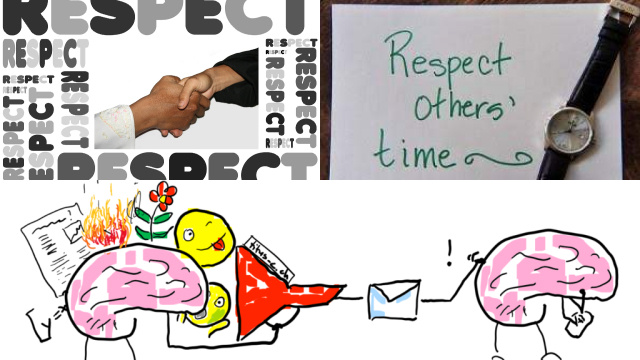Rule #1: Respect others’ time and attention
Respecting others’ time and attention is an important rule of netiquette. In today’s fast-paced digital world, we are all bombarded with information and distractions. By respecting others’ time and attention, we show that we value and appreciate their presence in our lives.
This means being mindful of our own actions and behaviors, and considering how they may impact others. For example, we should avoid sending unnecessary emails or messages that can clutter someone’s inbox and distract them from important tasks. We should also avoid interrupting others when they are speaking, whether in-person or online. By respecting others’ time and attention, we can build stronger relationships, improve communication, and create a more positive online community. Ultimately, netiquette is about treating others the way we would like to be treated, both online and offline.
Rule #2: Think before you post or send a message
Thinking before posting or sending a message is another important rule of netiquette. In today’s digital age, it’s easy to post or send messages without giving them much thought, but this can lead to unintended consequences. Before posting or sending a message, we should take a moment to consider its tone, content, and potential impact on others. We should avoid posting or sending messages that are hurtful, disrespectful, or offensive. Instead, we should aim to communicate in a positive and respectful manner. Additionally, we should be mindful of our audience and tailor our message accordingly. For example, we may need to use different language or tone when communicating with colleagues versus friends or family members. By thinking before posting or sending a message, we can avoid misunderstandings, build stronger relationships, and create a more positive online community.
Rule #3: Use appropriate language and tone
Using appropriate language and tone is an essential rule of netiquette. The way we communicate online can have a significant impact on how others perceive us and can affect our relationships and interactions with them. When communicating online, we should use language and tone that are respectful, polite, and appropriate for the situation. We should avoid using offensive language or tone that can be hurtful or disrespectful to others. This includes refraining from using derogatory or discriminatory language or making inappropriate jokes or comments.
It’s also important to consider the cultural and social norms of the people we are communicating with. What may be considered appropriate language and tone in one culture or community may not be in another. We should be mindful of these differences and adjust our communication style accordingly to avoid misunderstandings or offense.
In addition, we should also pay attention to the context of the communication. For example, using all caps in an email or message can come across as yelling and may be perceived as aggressive or confrontational. By using appropriate language and tone, we can build positive relationships, avoid misunderstandings, and contribute to a respectful online community.
Rule #4: Avoid offensive and discriminatory language
Avoiding offensive and discriminatory language is a critical rule of netiquette. Using language that is offensive or discriminatory can hurt others, create misunderstandings, and damage relationships. It’s essential to avoid using language that discriminates against someone based on their race, gender, sexual orientation, religion, or other personal characteristics.
Using such language is not only disrespectful but can also lead to legal and social consequences. The use of derogatory language and slurs can lead to discrimination, harassment, and exclusion. It can also create a hostile environment that can negatively impact the mental and emotional well-being of individuals.
To avoid using offensive and discriminatory language, it’s important to be aware of the language we use and how it may be perceived by others. We should use language that is respectful and inclusive, avoiding stereotypes and assumptions. Additionally, we should be open to feedback and willing to learn from our mistakes. By avoiding offensive and discriminatory language, we can promote respect, inclusion, and a positive online community.
Rule #5: Use proper grammar and spelling
Using proper grammar and spelling is an important rule of netiquette. Communicating with proper grammar and spelling shows respect for your audience and helps to ensure that your message is clearly understood. Poor grammar and spelling can make your communication difficult to read and may result in confusion or misunderstandings. It can also come across as unprofessional and careless, potentially damaging your reputation.
To use proper grammar and spelling, take the time to review and edit your message before sending it. Use spell-check and grammar-check tools if necessary, and consider having someone else review your message if you are unsure about your writing. It’s also helpful to brush up on basic grammar rules and spelling conventions.
By using proper grammar and spelling, you can improve the clarity and effectiveness of your communication and convey a professional image.
Rule #6: Be careful with humor and sarcasm
Humor and sarcasm can be tricky to convey in written communication and can often be misinterpreted. It’s important to be careful when using humor or sarcasm in online interactions, as what may be intended as a joke or sarcastic remark may come across as offensive or insulting to the recipient.
To avoid misunderstandings, it’s important to consider your audience and how your message may be perceived. If you are unsure about how your message will be received, it’s best to err on the side of caution and avoid using humor or sarcasm.
When using humor or sarcasm, it’s also important to use clear language and avoid using language that could be misconstrued. Use cues such as emoticons or “lol” to indicate that you are joking or being sarcastic.
By being mindful of the potential for misunderstandings and using clear language, you can use humor and sarcasm in online interactions without inadvertently causing offense or harm.
Rule #7: Respect people’s privacy
Respecting people’s privacy is a crucial aspect of netiquette. In online interactions, it’s important to remember that everyone has the right to their personal information and that sharing that information without permission can be a violation of their privacy.
To respect people’s privacy, avoid asking for personal information that is not necessary for the interaction. If you do need to ask for personal information, be clear about why you need it and how it will be used.
It’s also important to respect people’s boundaries when it comes to sharing personal information. If someone does not feel comfortable sharing certain information, don’t press them or make them feel obligated to do so.
In addition, be mindful of sharing other people’s personal information, such as their email address or phone number, without their permission. Even if you think it’s harmless, sharing someone’s personal information without their consent can be a breach of their privacy.
By respecting people’s privacy, you can create a positive and respectful online environment where people feel comfortable interacting and sharing information.
Rule #8: Be mindful of cultural differences
In a global online environment, it’s important to be aware of cultural differences and to be respectful of diverse perspectives and beliefs. Different cultures may have different norms and values, which can influence communication styles and etiquette.
To be mindful of cultural differences, take the time to learn about different cultures and their customs. Avoid making assumptions or stereotyping people based on their cultural background.
In addition, be aware of how your own cultural background may influence your communication style and be open to adapting your approach when interacting with people from different cultures.
By being mindful of cultural differences, you can avoid unintentionally causing offense or misunderstanding in your online interactions. You can also promote a more inclusive and respectful online community that values diversity and encourages cross-cultural communication.
In the dynamic and diverse landscape of the digital realm, mastering constructive communication is paramount, especially when disagreements arise. Navigating disagreements online demands a nuanced approach that fosters understanding and resolution.
Firstly, it’s essential to maintain respect and civility. Online discussions often lack the visual and auditory cues present in face-to-face interactions, making tone and intent harder to discern. Choosing words carefully and avoiding inflammatory language contributes to a more constructive environment.
Active listening plays a pivotal role. Instead of focusing solely on expressing your viewpoint, take the time to understand the perspectives of others. Acknowledge their concerns and address them thoughtfully, demonstrating a commitment to open dialogue.
Utilizing private messages or direct communication channels can be more effective than engaging in public debates. This approach minimizes the potential for misinterpretation and allows for a more focused and personalized discussion.
When disagreements persist, consider seeking common ground. Identifying shared values or goals can serve as a foundation for finding solutions. Constructive communication involves a willingness to compromise and collaborate for the greater good.
Lastly, be open to revisiting and reassessing your own stance. In the digital realm, where information flows rapidly, being receptive to new insights and adjusting your viewpoint demonstrates intellectual flexibility and a commitment to truth.
In essence, navigating disagreements in the digital realm requires a combination of empathy, active listening, and a commitment to maintaining respectful and constructive communication channels, fostering a healthier online discourse.





